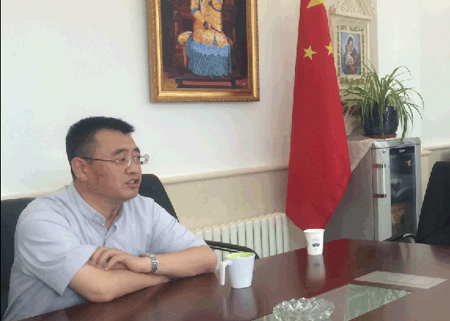Beijing Archbishop Li Shan gets a coadjutor, Zhen Xuebin
Set for Friday, 25 October, the ordination in the Chinese capital becomes the first appointment (in agreement with Rome) after the renewal of the Agreement on episcopal appointments, expected in the coming days. The new prelate is 54 years old, just five years younger than Archbishop Li Shan, who has led the Church in Beijing since 2007. As a seminarian, Zhen Xuebin trained at St. John's University in the United States, where he studied Vatican II.
Beijing (AsiaNews) – Beijing will soon have a coadjutor bishop, Mgr Matthew Zhen Xuebin (pictured), 54, who will support Archbishop Joseph Li Shan who has led the Catholic community of the Chinese capital since 2007.
The priests of the diocese today received the invitation to attend the ordination which is already set for next Friday, 25 October, at 9 am at the Cathedral of Saint Saviour (Xishiku Church), led by Archbishop Li Shan himself.
Zhen Xuebin’s appointment takes place in agreement with the Holy See and will be the first after the Provisional Agreement between China and the Holy See on episcopal appointments is renewed, which is expected in the coming days since the two-year extension signed in 2022 expires on 22 October.
The choice of a coadjutor bishop for Beijing is a remarkable fact if we consider that Archbishop Li, appointed before the Agreement came into force in 2018, but already with the approval of Rome, is 59 years old, only five years older than Zhen Xuebin.
Sources told AsiaNews that the archbishop asked for a coadjutor for health reasons but also because of his many duties outside Beijing as president of the Chinese Catholic Patriotic Association.
For his part, Fr Zhen Xuebin holds the position of secretary general and chancellor of the diocese, dealing with the pastoral governance of the Church in Beijing.
The profile of the new prelate is also interesting. Unlike Li Shan, who was born and grew up in the Chinese capital, Fr Zhen Xuebin hails from Shanxi province. In the 1990s, he was among the first Chinese seminarians to have the opportunity to train abroad.
From 1993 until 1998, he attended St. John's University, a private Catholic university in in Collegeville, Minnesota, USA, affiliated with the Benedictines, where he earned two degrees, in theology and liturgy, focusing on the ecclesiology of the Second Vatican Council, before returning to Beijing to be ordained a priest.
This experience outside China remained a point of reference for him in the following years during which he taught at the Beijing seminary and took on positions of responsibility within the local Church.
As for the Agreement between China and the Holy See on episcopal appointments, the announcement of the renewal should confirm its provisional nature (despite Beijing insisting on making it definitive), while remaining secret in its content and without variations (which Rome would like to change).
Meanwhile, Vatican News reported yesterday on what the two bishops from the People's Republic of China said at the second session of the synod; unlike last year, when they returned home halfway through the session, they are still in Rome.
Bishop Joseph Yang Yongqiang of Hangzhou described the journey of the Church in China, saying, “We follow the evangelical spirit of 'becoming all things to all people’,” and “We effectively adapt to society, serve it, adhere to the direction of the sinicization of Catholicism, and preach the Good News.”
“[W]e strive to be like 'light and salt' for world peace and the promotion of a community where humanity can enjoy a shared destiny; finally, we promote development through various types of projects.”
The bishop extended “a welcome to Catholic communities and religious groups from all countries who wish to visit the Church in China."
For his part, Bishop Vincent Zhan Silu of Mindong, touched the topic of inculturation, referring to the painful experience concerning the Controversy over Chinese rites that developed in the 17th century, starting in his diocese.
“Being a synodal Church engaged in the mission of evangelization means respecting and listening to the voices of different stories, cultures, and traditions in the journey of seeking humanity's ultimate goal, which is God,” Bishop Zhan explained.
The issues the Chinese Church must face with new eyes include "how to address the challenges that mixed marriages present for family education; how to adapt to local laws and regulations; or how to resolve the confusion that exists among the laity between popular beliefs and some aspects of traditional culture.”
20/02/2018 12:55
24/10/2019 17:56
16/07/2020 13:26







.png)










